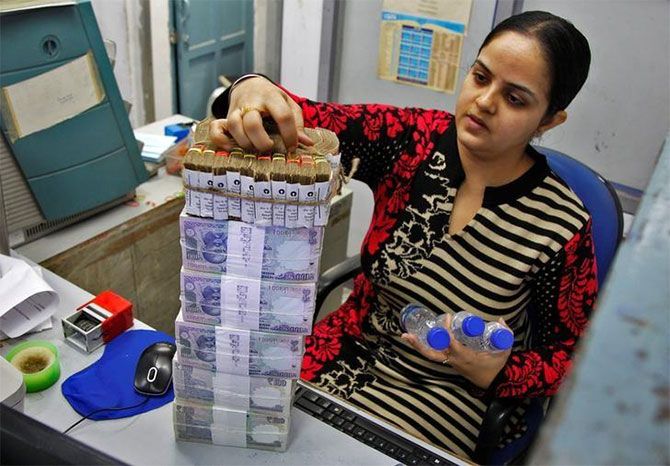The indebtedness of Indian companies has had an adverse impact on the economy’s investment climate apart from weakening their performance and seriously impairing the financial health of the banking sector.
Unless both the problems are resolved, there is little chance of reviving investment and boosting growth on a sustainable basis, says A K Bhattacharya.

It is commonly acknowledged that India’s financial sector mess has given rise to two specific but inter-related challenges.
There is the challenge arising out of the poor health of banks because of the huge burden of their non-performing assets (NPAs) or sticky loans. And then, there is an equally formidable challenge of tackling the growing indebtedness of a large number of companies, particularly in the infrastructure sector, that undermines their ability to repay their loans.
This is also described as the twin balance sheet problem of the Indian economy.
The indebtedness of Indian companies has had an adverse impact on the economy’s investment climate apart from weakening their performance and seriously impairing the financial health of the banking sector.
Unless both the problems are resolved, there is little chance of reviving investment and boosting growth on a sustainable basis.
A way out of the first challenge of NPAs is to clean up the bad loans through appropriate haircuts enforced on promoters of projects for which the loans had been granted by the banks.
This would also give a fresh opportunity for these projects to take off without the burden of accumulated loans, helping improve the investment climate as a consequence.
Simultaneously, the banks would be free from the crippling burden of their past non-performing loans and start considering fresh advances for new projects.
All this is well-known. The solutions have been discussed and many schemes have been introduced, but little progress has taken place in freeing India Inc from its burden of indebtedness.
Nor have the country’s banks, particularly those owned by the government, come closer to untangling the NPA knot.
All that the various schemes of the past few years, like the asset quality review process or the strategic debt restructuring programme, have achieved is to allow a more transparent system of recognising the size of the problem.
A ray of hope, however, seems to have emerged from what the government and the Reserve Bank of India (RBI) are now planning in an attempt to tackle a part of this problem.
The government has rightly sensed that the managements of the state-owned banks are reluctant to clean up their loan books by taking bold decisions like selling their sticky loans at a discount or forcing a sell-out by delinquent promoters of projects that have been unable to service the loans.
So, the new plan is to rope in the RBI and legally empower it to ensure that the bank managements take those hard decisions of cleaning up their loan books even at a loss and without any fears of any adverse actions or investigations by law enforcement agencies.
The new strategy has a good chance of yielding some positive outcomes. This is because it is the first time that the central bank is being asked to play its role as the regulator of banks.
For some unexplained reasons, so far, the government was hoping that the goal of tackling the NPA problem would be achieved if the central bank merely launched a few schemes to facilitate the clean-up of stressed loan books of banks.
Clearly that plan did not work. Now, the central bank is being asked to play a more active role in tackling the menace of willful defaulters, growing indebtedness and bulging NPAs of banks.
Banks will now be forced to take quick decisions through the joint lenders’ forum and such decisions could result in auctions of stressed assets, impairments for promoters and penalties for willful defaulters. And the charge for this initiative will be led by the RBI.
Politically also this seems to be a pragmatic move. One of the reasons why the Narendra Modi government has remained a little indifferent to the urgent need for resolving the banks’ NPA problem is the fear of a political fallout of such a move being seen as friendly to big business.
It had tried hard to amend the land acquisition and rehabilitation law of 2013 to help India Inc acquire land on easier terms. That move was dropped after the political pushback was intense with the Modi government being branded as a “suit-boot ki sarkar” (a government friendly to the rich).
Since then, it has been wary of taking steps that might be seen as benefitting big business or the rich. Thus, the promised cut in the corporation tax rate for big companies is yet to be announced and instead the tax rate for those earning above Rs 50 lakh a year has been raised even as the tax rate for the lower-income category has been reduced.
Similarly, the government was not keen on being seen on the forefront of any move to resolve the banks’ NPA problem which once again would benefit the big business.
Note that the latest move to clean up the bank NPAs would be initiated under the supervision of the RBI, and the government is not going to be the face of the new scheme. An adverse political fallout, therefore, may be averted.
For precisely the same reason of a political fall-out, the second challenge facing the financial sector is not likely to see an early resolution. This challenge comes from the poor financial health of state-owned banks.
While resolving the NPAs will help some of these banks, many of them are financially so weak that they require a major overhaul either through a merger with a healthier bank or a closure. Unfortunately, however, the chances of the government introducing such measures now are dim.
The worst three state-owned banks are all headquartered in West Bengal, a state that is now ruled by Mamata Banerjee’s Trinamool Congress.
It is also the state where the Bharatiya Janata Party (BJP) will like to expand its footprint and any decision to close these banks, employing a large number of people from the state, would make the central government unpopular and give Trinamool Congress an opportunity to rally its supporters against the BJP.
Not surprisingly, the Modi government will be wary of taking such bold decisions on merger or closure of these banks in West Bengal, even though such remedial steps can no longer be deferred.
Thus, the RBI-led initiative may help India Inc deleverage significantly and clean up the stressed loan books of some banks, but the larger problem of financially weak state-owned banks requiring frequent capital infusion is not going to be resolved soon.
Photograph: Ajay Verma/reuters








